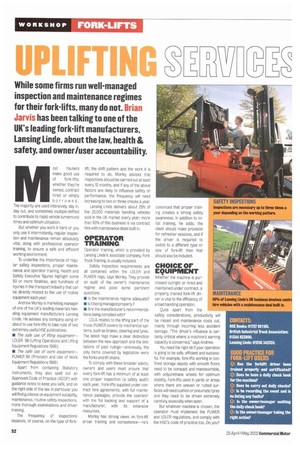make good use of fork-lifts: whether they're owned, contract hired
Page 52

If you've noticed an error in this article please click here to report it so we can fix it.
or simply borrowed. 11111 ost hauliers make good use of fork-lifts: whether they're owned, contract hired or simply borrowed.
The majority are used intensively, day in, day out, and sometimes multiple-shifted to contribute to rapid vehicle turnaround times and optimum utilisation.
But whether you work it hard or you only use it intermittently, regular inspection and maintenance remain absolutely vital, along with professional operator training, to ensure a safe and efficient working environment.
To underline the importance of regular safety inspections, proper maintenance and operator training, Health and Safety Executive figures highlight some 50 or more fatalities, and hundreds of injuries in the transport industry that can be directly related to the use of mobile equipment each year.
Andrew Morley is marketing manager of one of the UK's leading materials handling equipment manufacturers Lansing Linda. He advises any company using or about to use fork-lifts to take note of two extremely useful HSE publications: • The safe use of lifting equipmentLOLER 98 (Lifting Operations and Lifting Equipment Regulations 1998): • The safe use of work equipmentPUWER 98 (Provision and Use of Work Equipment Regulations 1998).
Apart from containing Statutory instruments, they also spell out an Approved Code of Practice (ACOP) with guidance notes to keep you safe, and on the right side of the law. In particularyou will find guidance on equipment suitability, maintenance, routine safety inspections, more thorough examinations and driver training.
The frequency of inspections depends, of course, on the type of fork
lift, the shift pattern and the work it is required to do. Morley advises that inspections should be carried out at least every 12 months, and if any of the above factors are likely to influence safety or performance, the frequency will need increasing to two or three checks a year.
Lansing Linde delivers about 25% of the 25.000 materials handling vehicles sold in the UK market every year; more than 80% of this business is via contract hire with maintenance deals built in.
OPERATOR TRAINING
Operator training, which is provided by Lansing Linde's associate company, Fork Truck Training, is usually included.
Safety inspection requirements are all contained within the LOLER and PUWER regs, says Morley. They provide an audit of the owner's maintenance regime and pose some pertinent questions:
• Is the maintenance regime adequate? le Is it being managed properly P
• Are the manufacturer's recommendations being complied with?
LOLA relates to the lifting part of the truck; PUWER covers its mechanical systems, such as brakes, steering and tyres. The latest regs make a clear distinction between the new approach and the limitations of past rulings—previously, the only items covered by legislation were the forks and lift chains.
To comply with these broader edicts, owners and users must ensure that every fork-lift has a minimum of at least one proper inspection (a safety audit) each year. Fork-lifts supplied under contract hire agreements, with full maintenance packages, provide the operator with the full backing and support of a manufacturer, with its extensive resources.
Morley has strong views on fork-lift driver training and competence—he's convinced that proper training creates a strong safety awareness. In addition to initial training, he adds, the client should make provision for refresher sessions, and if the driver is required to switch to a different type or size of fork-lift then that should also be included.
CHOICE OF EQUIPMENT
Whether the machine is purchased outright or hired and maintained under contract, a properly trained fork-lift driver is vital to the efficiency of a load handling operation.
Quite apart from the safety considerations, productivity will be raised and maintenance costs cut, mainly through incurring less accident damage. "The driver's influence is certainly critical where a machine's earning capacity is concerned," says Andrew.
You need the right kit if your operation is going to be safe, efficient and successful. For example, fork-lifts working in confined storage depots with smooth floors need to be compact and manoeuvrable, with polyurethane wheels for optimum stability Fork-lifts used in yards or areas where there are uneven or rutted surfaces will need cushion or pneumatic tyres and they need to be driven extremely carefully, especially when laden.
But whatever machine is chosen, the operator must implement the PUWER and LOLER regulations, and comply with the HSC's code of practice too. Do you?












































































































































































